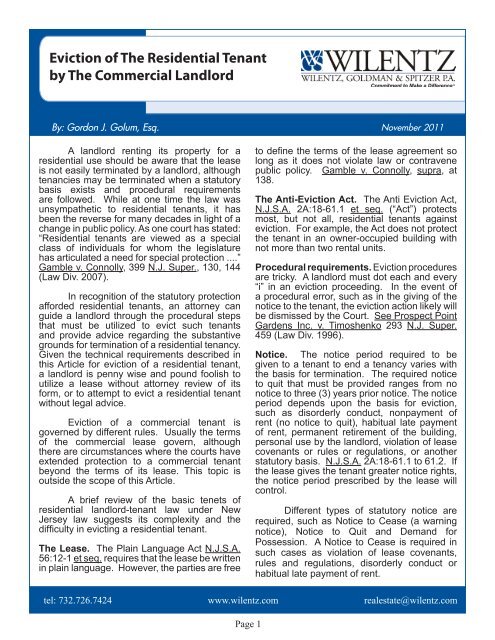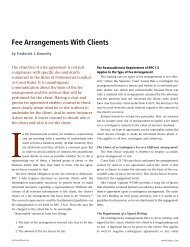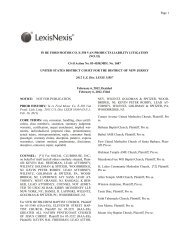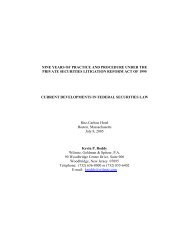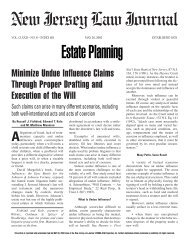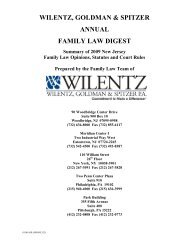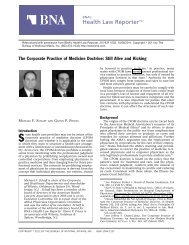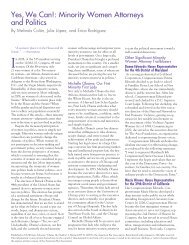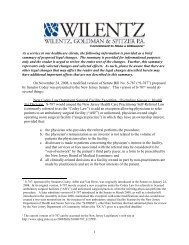Eviction of The Residential Tenant by The Commercial Landlord
Eviction of The Residential Tenant by The Commercial Landlord
Eviction of The Residential Tenant by The Commercial Landlord
Create successful ePaper yourself
Turn your PDF publications into a flip-book with our unique Google optimized e-Paper software.
<strong>Eviction</strong> <strong>of</strong> <strong>The</strong> <strong>Residential</strong> <strong>Tenant</strong><br />
<strong>by</strong> <strong>The</strong> <strong>Commercial</strong> <strong>Landlord</strong><br />
By: Gordon J. Golum, Esq. November 2011<br />
A landlord renting its property for a<br />
residential use should be aware that the lease<br />
is not easily terminated <strong>by</strong> a landlord, although<br />
tenancies may be terminated when a statutory<br />
basis exists and procedural requirements<br />
are followed. While at one time the law was<br />
unsympathetic to residential tenants, it has<br />
been the reverse for many decades in light <strong>of</strong> a<br />
change in public policy. As one court has stated:<br />
“<strong>Residential</strong> tenants are viewed as a special<br />
class <strong>of</strong> individuals for whom the legislature<br />
has articulated a need for special protection ....”<br />
Gamble v. Connolly, 399 N.J. Super., 130, 144<br />
(Law Div. 2007).<br />
In recognition <strong>of</strong> the statutory protection<br />
afforded residential tenants, an attorney can<br />
guide a landlord through the procedural steps<br />
that must be utilized to evict such tenants<br />
and provide advice regarding the substantive<br />
grounds for termination <strong>of</strong> a residential tenancy.<br />
Given the technical requirements described in<br />
this Article for eviction <strong>of</strong> a residential tenant,<br />
a landlord is penny wise and pound foolish to<br />
utilize a lease without attorney review <strong>of</strong> its<br />
form, or to attempt to evict a residential tenant<br />
without legal advice.<br />
<strong>Eviction</strong> <strong>of</strong> a commercial tenant is<br />
governed <strong>by</strong> different rules. Usually the terms<br />
<strong>of</strong> the commercial lease govern, although<br />
there are circumstances where the courts have<br />
extended protection to a commercial tenant<br />
beyond the terms <strong>of</strong> its lease. This topic is<br />
outside the scope <strong>of</strong> this Article.<br />
A brief review <strong>of</strong> the basic tenets <strong>of</strong><br />
residential landlord-tenant law under New<br />
Jersey law suggests its complexity and the<br />
difficulty in evicting a residential tenant.<br />
<strong>The</strong> Lease. <strong>The</strong> Plain Language Act N.J.S.A.<br />
56:12-1 et seq. requires that the lease be written<br />
in plain language. However, the parties are free<br />
to define the terms <strong>of</strong> the lease agreement so<br />
long as it does not violate law or contravene<br />
public policy. Gamble v. Connolly, supra, at<br />
138.<br />
<strong>The</strong> Anti-<strong>Eviction</strong> Act. <strong>The</strong> Anti <strong>Eviction</strong> Act,<br />
N.J.S.A. 2A:18-61.1 et seq. (“Act”) protects<br />
most, but not all, residential tenants against<br />
eviction. For example, the Act does not protect<br />
the tenant in an owner-occupied building with<br />
not more than two rental units.<br />
Procedural requirements. <strong>Eviction</strong> procedures<br />
are tricky. A landlord must dot each and every<br />
“i” in an eviction proceeding. In the event <strong>of</strong><br />
a procedural error, such as in the giving <strong>of</strong> the<br />
notice to the tenant, the eviction action likely will<br />
be dismissed <strong>by</strong> the Court. See Prospect Point<br />
Gardens Inc. v. Timoshenko 293 N.J. Super.<br />
459 (Law Div. 1996).<br />
Notice. <strong>The</strong> notice period required to be<br />
given to a tenant to end a tenancy varies with<br />
the basis for termination. <strong>The</strong> required notice<br />
to quit that must be provided ranges from no<br />
notice to three (3) years prior notice. <strong>The</strong> notice<br />
period depends upon the basis for eviction,<br />
such as disorderly conduct, nonpayment <strong>of</strong><br />
rent (no notice to quit), habitual late payment<br />
<strong>of</strong> rent, permanent retirement <strong>of</strong> the building,<br />
personal use <strong>by</strong> the landlord, violation <strong>of</strong> lease<br />
covenants or rules or regulations, or another<br />
statutory basis. N.J.S.A. 2A:18-61.1 to 61.2. If<br />
the lease gives the tenant greater notice rights,<br />
the notice period prescribed <strong>by</strong> the lease will<br />
control.<br />
Different types <strong>of</strong> statutory notice are<br />
required, such as Notice to Cease (a warning<br />
notice), Notice to Quit and Demand for<br />
Possession. A Notice to Cease is required in<br />
such cases as violation <strong>of</strong> lease covenants,<br />
rules and regulations, disorderly conduct or<br />
habitual late payment <strong>of</strong> rent.<br />
tel: 732.726.7424 www.wilentz.com realestate@wilentz.com<br />
Page 1
<strong>Eviction</strong> <strong>of</strong> <strong>The</strong> <strong>Residential</strong> <strong>Tenant</strong><br />
<strong>by</strong> <strong>The</strong> <strong>Commercial</strong> <strong>Landlord</strong><br />
By: Gordon J. Golum, Esq.<br />
<strong>The</strong> manner in which notice must be<br />
provided when based upon lease violations<br />
is demonstrated <strong>by</strong> the following example:<br />
Assume that a residential tenant pays the<br />
rent as required, but plays loud music late at<br />
night. <strong>The</strong> landlord has received complaints<br />
from other tenants. What should the landlord<br />
do? <strong>The</strong> landlord should send a Notice to<br />
Cease, which is a warning notice to the tenant<br />
to cease the disorderly behavior. This gives<br />
the tenant an opportunity to cure. <strong>The</strong>re is<br />
no set statutory period in which the tenant is<br />
required to cure. It has to be a reasonable<br />
period under the circumstances. If the tenant<br />
fails to discontinue the disorderly conduct, the<br />
landlord’s next step is to send a Notice to Quit<br />
to the tenant followed <strong>by</strong> a filing <strong>of</strong> an eviction<br />
proceeding.<br />
Lease Renewal. A landlord is required to <strong>of</strong>fer<br />
to renew a residential lease in most cases.<br />
N.J.S.A. 2A:18-61.3.<br />
Basis for Lease Termination. A landlord may<br />
evict a tenant if the situation at hand fits within<br />
one <strong>of</strong> the statutory bases. <strong>The</strong>se cases are<br />
fact sensitive. By way <strong>of</strong> generalization and<br />
subject to various caveats and exceptions,<br />
termination <strong>of</strong> a residential tenancy is permitted<br />
on the following grounds:<br />
(a) A tenant may be evicted for various acts<br />
that might be characterized as bad acts or<br />
tenant fault. This includes non-payment <strong>of</strong> rent,<br />
habitual late payment <strong>of</strong> rent, and disorderly<br />
conduct (such as, an assault upon the landlord<br />
or another tenant, theft <strong>of</strong> property from the<br />
building containing the premises, use <strong>of</strong> the<br />
premises for prostitution or conviction <strong>of</strong> a<br />
tenant for drug use).<br />
covenants and terms <strong>of</strong> the lease, provided<br />
such covenants or terms are reasonable and<br />
were in the lease at the beginning <strong>of</strong> the term.<br />
(d) Personal occupancy <strong>of</strong> the premises <strong>by</strong> a<br />
prospective buyer <strong>of</strong> the premises or occupancy<br />
<strong>by</strong> the landlord <strong>of</strong> the premises, which landlord<br />
must be an individual and not an entity, such<br />
as a corporation or limited liability company.<br />
Realty LLC v. Law, 406 N.J. Super. 423 (App.<br />
Div. 2009).<br />
(e) <strong>The</strong> landlord seeks to permanently board<br />
up or demolish the premises under certain<br />
conditions to correct substantial violations<br />
affecting the health and safety <strong>of</strong> tenants where<br />
it is not feasible to do so without removing the<br />
tenant, or the landlord wishes to permanently<br />
retire the building from residential use.<br />
(f) Refusal <strong>of</strong> tenant to accept reasonable<br />
changes in the terms and conditions <strong>of</strong> the<br />
lease upon renewal.<br />
Conclusion. This Article has briefly reviewed<br />
basic principles <strong>of</strong> New Jersey landlord-tenant<br />
residential law, generally noting the bases<br />
and procedures to evict tenants from leased<br />
premises. As the foregoing illustrates, a<br />
landlord must follow the letter <strong>of</strong> New Jersey<br />
law to end a residential tenancy. A successful<br />
eviction is possible when the correct procedural<br />
steps are taken, and the landlord brings an<br />
action founded upon one <strong>of</strong> the statutory bases<br />
for lease termination under New Jersey law.<br />
Gordon J. Golum is a Shareholder at Wilentz,<br />
Goldman & Spitzer, P.A. Contact Gordon at<br />
(732) 855-6056, or at ggolum@wilentz.com.<br />
(b) <strong>The</strong> tenant has willfully or <strong>by</strong> reason <strong>of</strong> gross<br />
negligence caused or allowed destruction,<br />
damage or injury to the premises.<br />
(c) After written notice to cease violation <strong>of</strong><br />
rules and regulations governing the premises<br />
or substantial violation or breach <strong>of</strong> the<br />
This article is for informational purposes only, does not constitute legal advice, and may not be reasonably relied upon as such.<br />
You should consult a qualified attorney for independent legal advice with regard to any particular set <strong>of</strong> facts.<br />
tel: 732.726.7424 www.wilentz.com realestate@wilentz.com<br />
Page 2


